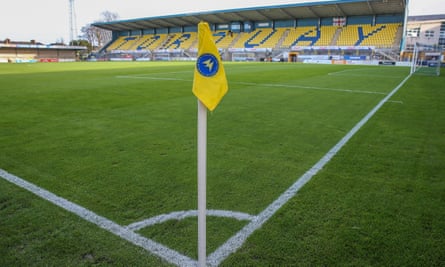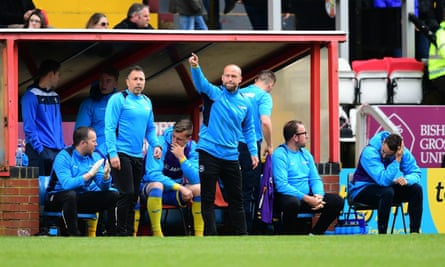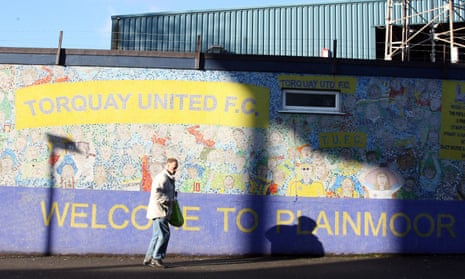On the morning before their late mugging at Lincoln City on Friday, travelling Torquay United supporters had given up waiting for their tickets to go on sale. They made the 544-mile round trip from Plainmoor anyway following assurances they would be able to pay cash at the Sincil Bank turnstiles to see their relegation-threatened team take on the league leaders in the latest chapter of what Gulls fans have called the Great Escape II.
Seven points from their final four matches enabled Torquay to remain in the fifth tier of English football last season and, with three games left in this campaign, they will need even more impressive heroics to avoid a maiden descent into the particular circle of football hell that is the National League South. Among fans, there is genuine concern the club hierarchy would not be fussed by such a fate.
“What they’re trying to do is run a full-time operation paying part-time wages,” says Alan Merson, a lifelong fan who runs the Beyond The Penn Inn Roundabout fan forum. He reveals that Torquay have players on their books earning £300 per week in a league where most of their peers are paid at least twice that amount. Some are housed in a converted lodge originally designed to accommodate young scholar pros.
“They’ve got players in there two to a one-man room,” says Merson. “These are grown men, sleeping in bunks. It’s like a prison. I know of one player last year who was travelling down from Birmingham. After matches he was going back there to work on nightclub doors for an extra £50 a night. This whole disinterest in football by Torquay’s owners is not just suspicious, it’s obvious.”
It hasn’t always been this way. Located in one of Britain’s more beautiful coastal towns, United were a staple of the lower leagues since the 1920s, save for a two-year sabbatical in the Conference between 2007 and 2009. With the financial backing of fans Paul and Thea Bristow, who won £15m on the national lottery, the club regained their Football League status and built a £2m grandstand boasting corporate facilities that make a mockery of their current status. When Paul Bristow died in 2010, Thea continued to fund the club for several years before selling to a group of 10 local businessmen for £1. Well-intentioned but ultimately incapable, the consortium was short-lived and soon numbered five.
Having become over-reliant on the largesse of their nouveau riche patrons, the new owners had discovered the club was not sustainable in their absence and invested £40,000 each to keep the Gulls afloat. In 2015, a management team led by Chris Hargreaves and costing £4,000 per week was put on gardening leave and replaced by Paul Cox, who agreed to work for expenses but left after 10 weeks. He was replaced by player-manager Kevin Nicholson, a former Torquay left-back with 314 appearances but no managerial experience. “He’s a 34-year-old [now 36] player-manager who’s a lovely guy, very conscientious and hard-working but, you know … if my car is backed over a cliff with the back wheels hanging off, I wouldn’t put a learner driver behind the wheel to get it back to safety,” says Merson.

Nicholson remains in charge, doing his best in straitened circumstances, but the board who hired him departed in December. Having put their shares in the club up as collateral to borrow almost £150,000 from a businessman named Clarke Osborne, they relinquished control before Christmas to avoid going into administration.
The owner of Gaming International, a company with a history of investing in sports grounds for redevelopment purposes, Osborne is a wrecking ball with a history of razing stadiums on the promise of building replacements that never materialise. To date, he has been responsible for the eviction of Bristol Rovers from Eastville and the closure of greyhound and speedway tracks, in places such as Reading and Milton Keynes. GI is also the tenant of the council-owned Poole Stadium, where it runs the dogs and leases the speedway track to the local club. Osborne arrived at Torquay promising investment in a bid to stave off relegation but no new players were signed.
As if their club’s on-field travails were not stressful enough, Torquay fans are concerned about Osborne’s plans for Plainmoor, which their club has leased from Torbay Council since 1921. He has made no secret of his plan to build a new ground on the outskirts of town, but when it comes to sports arenas his history is one of destruction, not construction. Although Torbay Council denies he has made a formal approach about buying the freehold of Plainmoor, there have been informal talks.
Osborne says the council wants “to see a successful club and facilities, whether they are here [at Plainmoor] or elsewhere”. On 26 April, the local Tory mayor, Gordon Oliver, is due to make a decision on the future of the ground and many Torquay fans believe the freehold will be sold to GI. An executive mayor, Oliver can make that decision without consultation and a council meeting scheduled for Wednesday to discuss a report into the valuation of the ground has been cancelled. In short, there will be no discussion for locals to scrutinise before Mayor Oliver issues his decree.
Backed by Supporters Direct, Michael Goulbourne, chairman of the Torquay United Supporters Trust, has listed the land on which Plainmoor is built as an Asset of Community Value and is disputing the council’s interpretation of ACV legislation. Having taken publicly funded legal advice, it informed an incredulous TUST that the ACV had been registered against the lease and not the freehold of Plainmoor, in effect making it redundant. Goulbourne has since contacted the Department for Communities and Local Government for clarification.

“Should the freehold be sold to anyone it loses the protection of the council,” he says. “The ground can then be sold, mortgaged or forfeit for debt. Companies fall into administration all the time and the dangers to the club and the community far outweigh any short-term financial gain from selling the freehold. The ramification is the loss of our home.
“We have to be realistic and accept that there may come a time when the club fails and supporters will be called upon to rebuild it. A difficult job could become impossible if we have lost our home.”
His solution to avoid such a calamitous turn of events? “If a plan is put forward that clearly demonstrates the development of a new stadium and the relocation of the team is in the club’s absolute long-term interests we will support it,” he says. “But build it first and leave the freehold under the protection of the council.”
In the meantime, Torquay United’s threadbare 15-man squad and beleaguered manager must strive to protect the club’s immediate future.
Good Friday could scarcely have been worse: having taken a late and unlikely lead against Lincoln, they suffered the heartbreak of conceding two goals in the final five minutes. With three games to go, their National League status hangs by a fraying thread.
